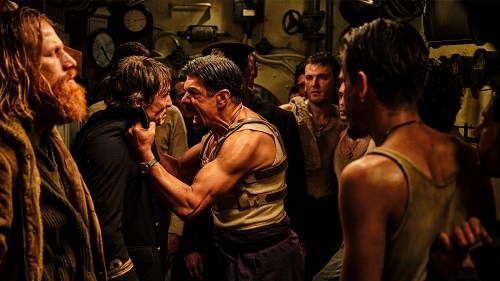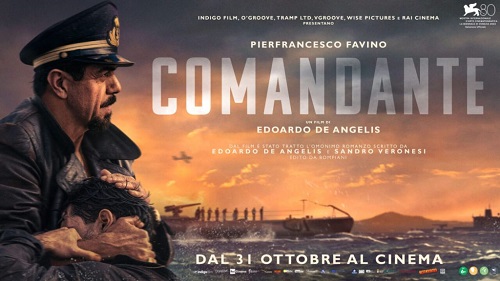Comandante, Tough And Sensitive Males
TORONTO – “Comandante” is not only further evidence that Italian cinema is re-emerging and re-claiming itself as a leader in World Cinema, but it inadvertently highlights some of today’s misguided social ideologies – namely the effort by some to “soften” – or emasculate – young men.
It wasn’t more than a few years ago that the American Psychological Association introduced new guidelines for working with men and boys, cautioning how “traditional” masculine traits are precursors to misogyny and aggression. And who could forget that contemptuous Gillette commercial that for ninety seconds forgot it was an ad for men’s personal care products and proceeded to depict young boys as unhinged schoolyard terrorists. “Comandante”, co-written and directed by Edoardo De Angelis and starring Pierfrancesco Favino, transports the viewer to a time when, “boys [at war] had more terror in their bodies than blood, but they don’t complain, they turn their weakness into devastating strength. They could pierce the hull of a destroyer with a fingernail”. These were our fathers and grandfathers, flawed men like any other, and not so because of their traditional masculine traits – but simply for the fact that they were human.
This 2023 film, which opened the 80th Venice Film Festival, is the true story of an Italian Submarine Commander and his rescue of a Belgian Ship crew in 1940. The Italian Commander, Salvatore Todaro, disobeys orders and takes the would-be enemy crew onto his ship, forcing him to navigate above surface – making his submarine an easy target for three days. Todaro, played by Favino, seems at first stoic, steadfast and every adjective one can use to describe a resolute brick house of a man. But his layers begin to unfurl as each of his men lands themselves in precarious situations, requiring his role as Commander to morph into something closer to a father, brother and friend. After his ammunitions man gets shot in the head during a firefight with the Belgians and survives, the Commander tells him while stitching him up, “for your valour you can address me with the informal ‘you’ as long as you place ‘Comandante’ in front of it”.
This kind of man, by the standard of some today, is objectionable for the “evil, hierarchical and authoritative” figure they believe he represents. Worse, critics will write things like, “While Comandante seems designed to make Italian audiences feel good about themselves and their history (which is fine; that’s one thing war movies do), the prospects for that hook carrying over to the U.S. market seem limited” – Variety. It’s worth noting that some of these American critics took no issue in “feeling good” about the fabricated and speculative history in the Netflix docu-series “Queen Cleopatra”, which controversially cast a black actress as the Macedonian Cleopatra. The series’ Director in a Variety article defiantly described the casting as a “political act”. By contrast, “Comandante’s” message is never intentionally political or gratuitously nationalistic, as some have charged. It is however an unapologetic hymn to the men and women of integrity who didn’t judge themselves by the politics of their day, but by the humanity which connected them all. To quote Todaro in the film: “We sink the ship without mercy, but the man we save”.
Massimo Volpe is a filmmaker and freelance writer from Toronto: he writes reviews of Italian films/content on Netflix





